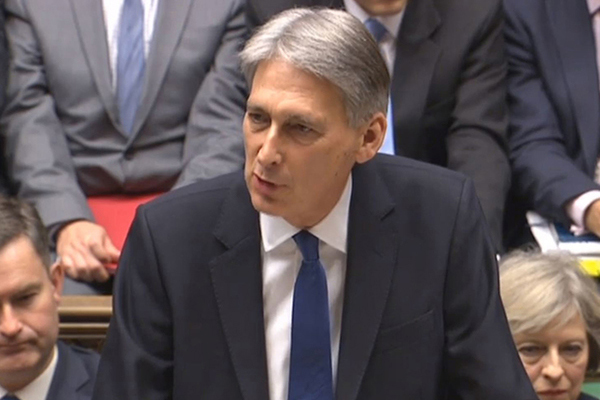You are viewing 1 of your 1 free articles

Hammond’s extra Universal Credit cash is welcome – but we also need homelessness specialists in job centres
The Autumn Budget must not become a missed opportunity to put in place measures to prevent homelessness, argues Ruth Jacob
Homelessness is not an inevitable part of our society. We know that in most cases it is preventable, and that in every case it can be ended.
Crisis’ new report, Preventing homelessness: It’s everybody’s business, helps show how this can be achieved.
It sets out recommendations for five government departments – the Department for Work and Pensions, Ministry of Justice, Department of Health and Social Care, Home Office, and Department for Education – on how they can help prevent people from becoming homeless.
The report also looks at some of the successful schemes already in place.
This issue could not be more urgent. There are 236,000 people in Britain experiencing the most acute forms of homelessness.
This includes people sleeping on our streets, sofa-surfing with strangers and living in overcrowded hostels.
“The Department for Work and Pensions should have dedicated housing and homelessness specialists in job centres to help people transitioning to Universal Credit.”
Many of these people are in dangerous situations – 449 homeless people have died in the UK over the past year, more than one every day, the Bureau of Investigative Journalism revealed this month.
Crisis’ report argues that the government’s Rough Sleeping and Homelessness Reduction Taskforce must lead on a strategy across government departments to prevent homelessness – and that any changes must be underpinned by legal duties.
It also sets out the changes departments need to make now to avoid missed opportunities to prevent homelessness.
Ahead of yesterday’s Autumn Budget, we called on the government to invest in one of the report’s recommendations in particular: that the Department for Work and Pensions should have dedicated housing and homelessness specialists in job centres to help people transitioning onto Universal Credit.
These specialists would help identify people at risk of homelessness and support them, both to find suitable housing and to move towards employment.
Chancellor Philip Hammond yesterday announced a £1bn package of measures to help people transitioning to Universal Credit, the details of which will be disclosed at a later date. This was a step in the right direction, but the government must ensure that these specialists are part of the package announced.
Yesterday’s budget must not become a missed opportunity to put in place measures to prevent homelessness.
Missed opportunities to prevent homelessness are especially true when it comes to people leaving state institutions.
Just over a quarter of care leavers have sofa-surfed since leaving care and 14% have slept rough, according to the charity Centrepoint.
A recent report from HM Inspectorate of Probation found that 15% of male and 13% of female prisoners serving short sentences were released without a home to go to.
Our report proposes that the Ministry of Justice, Department for Education and Home Office put in place Critical Time Intervention (CTI) for people leaving prison, the care system or accommodation for asylum seekers.
“Preventing homelessness makes financial sense, too.”
CTI is a proven solution where a case manager works with a person to find them housing before they leave a state institution, and continues to support them until they’re settled into their new home.
As well as being the right thing to do, preventing homelessness makes financial sense, too.
A 2015 research report commissioned by Crisis showed that for every person who was not effectively helped to avoid homelessness, the taxpayer incurred additional costs of between £3,000 and £18,000 in the first year of that person’s homelessness alone. Further research in 2016 estimated that if 40,000 people were prevented from experiencing one year of homelessness, public spending would fall by an estimated £370m.
Failing to act early can lead to a person experiencing repeated and entrenched periods of homelessness. This has knock-on costs for health services, drug and alcohol services and the criminal justice system – and it’s a devastating experience for the person concerned. At Crisis, our frontline teams see everyday how homelessness damages people’s health, job prospects and family relationships.
“With the right policies in place, Britain could end homelessness in 10 years.”
Recent changes to homelessness legislation have made prevention a priority. The Homelessness Reduction Act, which came into force in April, introduced new legal duties for councils to step in earlier to prevent homelessness and to do so for more people.
It also introduced a requirement for some public authorities, including prisons and job centres, to refer people who are homeless or at risk of homelessness to their council.
But this doesn’t go far enough. The primary responsibility for preventing homelessness remains with councils, even though in many cases they won’t be the first organisation that knows when someone is at risk.
There are already some inspiring projects out there.
In Newcastle, job centres have been working in partnership with the city council and the local Crisis service to embed a housing and homelessness approach, which is enabling work coaches to identify and support people who are homeless or at risk of homelessness. Just over a third of people who have engaged with the project have had their homelessness prevented or resolved so far.
Crisis’ research has shown that, with the right policies in place, Britain could end homelessness in 10 years.
We need everybody in to do this – every government department, every public authority and every one of us.
Ruth Jacob, senior policy officer, Crisis and author, Preventing homelessness: it’s everybody’s business report
Autumn Budget 2018 - the key housing policies at-a-glance
- £1bn to help fund the implementation of Universal Credit over the next five years
- £500m in Housing Infrastructure Fund to unlock a further 650,000 homes
- The next wave of strategic partnerships with nine housing associations, which will deliver 13,000 homes
- British business bank guarantees for SME house builders
- ‘Simplification’ of process to convert commercial properties to new homes
- Providing funding to empower 500 neighbourhoods to allocate homes to local people in perpetuity
- Help to Buy equity loan scheme extended by two years to 2023 and limited to first-time buyers
- Retrospective inclusion of first-time buyers of shared ownership in stamp duty relief
Autumn Budget 2018 - full coverage
All our Autumn Budget 2018 coverage in one place:
The Autumn Budget lacked the ambition we need Philip Hammond’s Budget fell short for housing, writes Melanie Rees
There were no big fireworks but the Budget offers an opportunity to deliver The Budget leaves associations facing a choice and we must now deliver, argues David Montague
Names of new housing association strategic partnerships revealed Homes England has released the names of the eight housing associations that have just signed strategic partnerships with the government.
Budget a missed opportunity on housing, says NHF Reaction to the Autumn Budget from several organisations, including the National Housing Federation
Budget small print reveals significant announcements for housing Housing policies contained in the Autumn Budget and background documents published yesterday will have a large impact, if they actually go ahead, writes Jules Birch
Hammond’s extra Universal Credit cash is welcome – but we need homelessness specialists in Job Centres too The Autumn Budget must not become a missed opportunity to put in place measures to prevent homelessness, argues Ruth Jacob of Crisis
Hammond announces extra funding for Universal Credit: Philip Hammond has announced plans to pump more money into Universal Credit in the Autumn Budget today.
Help to Buy equity loan scheme extended to 2023 for first time buyers:The Help to Buy equity loan scheme will be extended two years to 2023 for first time buyers only, with new price caps set for each English region.
Housing Live - the Autumn Budget 2018 as it happened: Live-blogging from Jules Birch reveals how the Autumn Budget unfolded and what it means for housing
OBR: scrapping council borrowing cap will deliver only 9,000 new homes: Scrapping the borrowing cap will deliver only 9,000 new homes over the next five years, the Office for Budget Responsibility (OBR) has said.
Letwin: builders of large sites must accept more ’diversity’ of tenure: Builders should be required to accept suggested levels of affordable housing for large sites in order to receive government support, including Help to Buy, a major review of housebuilding has concluded.
Chancellor announces strategic partnerships with nine housing associations: Nine housing associations have signed new strategic partnerships with the government to deliver over 13,000 homes, Philip Hammond has announced.
Stamp duty scrapped for buyers of shared ownership homes worth up to £500,000: Stamp duty will be scrapped for first-time buyers of homes for shared ownership, the chancellor has announced.
At a glance: Homelessness Reduction Act 2017
The Homelessness Reduction Act 2017 came into force in England on 3 April 2018.
The key measures:
- An extension of the period ‘threatened with homelessness’ from 28 to 56 days – this means a person is treated as being threatened with homelessness if it is likely they will become homeless within 56 days
- A duty to prevent homelessness for all eligible applicants threatened with homelessness, regardless of priority need
- A duty to relieve homelessness for all eligible homeless applicants, regardless of priority need
- A duty to refer – public services will need to notify a local authority if they come into contact with someone they think may be homeless or at risk of becoming homeless
- A duty for councils to provide advisory services on homelessness, preventing homelessness and people’s rights free of charge
- A duty to access all applicants' cases and agree a personalised plan















